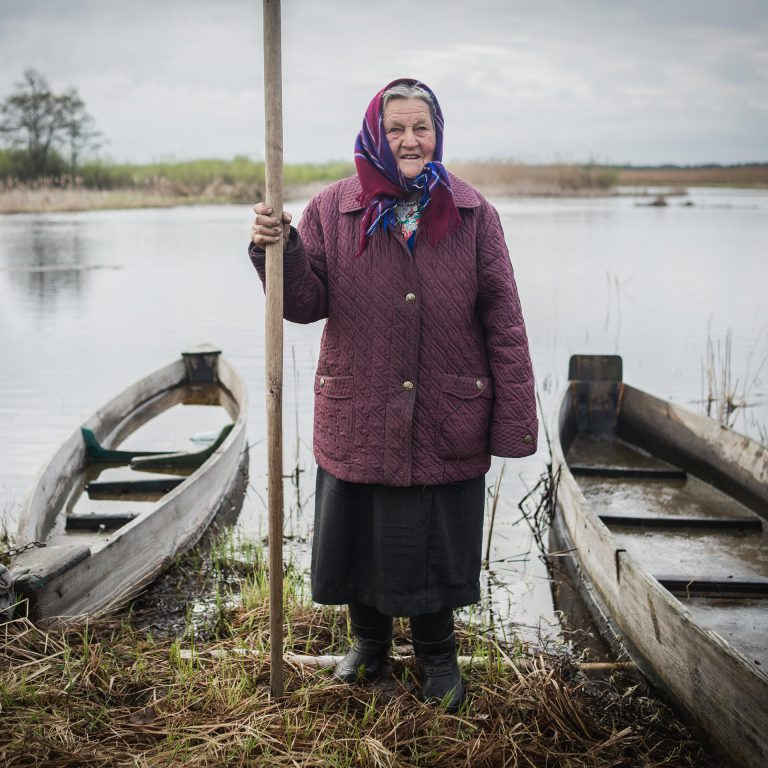In the villages of Polissia, the tradition of authentic Polissian singing has been preserved. Stari Koni, Komory, Svalovychi — in these and some other villages in Polissia, there are still people who remember the old songs that were known and sung by everyone. Local people used to learn singing easily and naturally. It was like breathing. Nowadays, when the number of villagers is sometimes not more than 30 and most of them are elderly, singing on the streets is a rare occurrence. Despite it all, there are some local people who still remember, preserve, sing, and even teach to sing.
Polissia is a region covered in forests and swamps. Due to their relative isolation, the Рolishchuky (Polishchuky are the indigenous population of Polissia) rarely interacted with inhabitants of other regions. Polishchuky had no need to leave their own region, and foreigners did not travel there often.

Traditional music, the music that was played and sung in the villages, remained without changes for quite a long time and slowly developed according to its own rules. The Soviet period and the urbanization it introduced had an immense influence on the everyday life of rural residents. Young people went to get an education or moved to cities, and when visiting or coming back they would bring to the villages “city fashion”, namely, songs that would change (most often simplify) authentic singing traditions that formed in the villages for centuries. However, in Polissia during Soviet times, there were not many plants and factories, the infrastructure was developed relatively poorly, people did not travel much, and, as a result, urban trends and lifestyles didn’t reach the Polissia villages for quite a long time.
“City fashion”, especially in music, penetrated into remote and hidden-in-the-forest villages way slower, and it let Polishchuky preserve their songs in archaic pristine form.
Polissia music is untamed and unlike any other. The songs preserved here are unique lyrics-wise as well as performance-wise: you can find female singers who use ancient singing techniques with lots of vocal ornamentation and range switching that differ Polissia singing from that of other regions.
They sing in two or three voices here: principal, bass, and head, the high pitched voice that, like everywhere else in Ukraine, only one person sings. Polissia head voices are strident and high pitched. It’s blood-chilling when you hear Polissia singing for the first time. The piercing sounds cut the air — they are sharp, as if created to get through the forests and swamps to the ears of someone else.
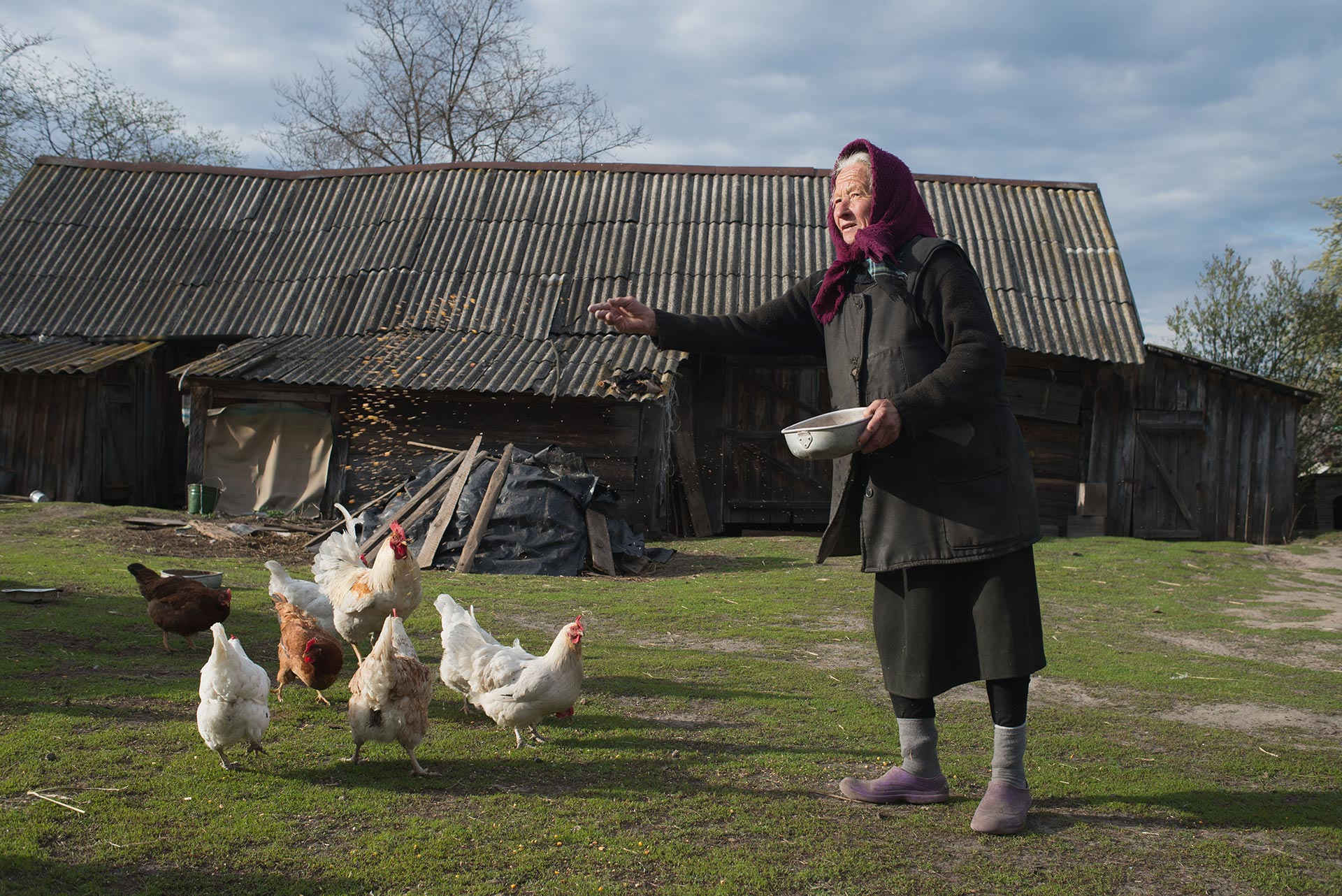
Stari Koni. Domynika
Domynika Chekun, or Granny Dania as she is called by her friends, is one of the most famous Ukrainian authentic singers. She has performed in many different cities of Ukraine and the former USSR. Her singing has been recorded on four disks, and the songs she has performed are included on the UNESCO Collection of Traditional Music, as part of world musical heritage. She has performed numerous times at festivals both in Ukraine and abroad, conducting master classes in singing.
Granny Dania’s house is painted dark red and blue. These colours, along with yellow and violet, are favourite colours of Polishchuky. On the wall there is an oil painting of two swans, a typical subject for folk pictures used by people to decorate their gates or houses in the villages. In the hall there is an old chest with a rich floral pattern, faded over time, and on the chest there is homemade bread with fennel that Domynika Chekun has baked all her life.
Some 70 years ago singing was a basic skill of almost everyone. For example, during weddings, not only “singers” sang — all unmarried girls from the family sang, because without their participation the rite would not be valid. Of course, there were exceptional male and female singers who were often invited to perform at weddings.
Singing and music were a favourite way to spend time together during various celebrations. People learned to sing casually just like learning to speak, cook, or take care of livestock.
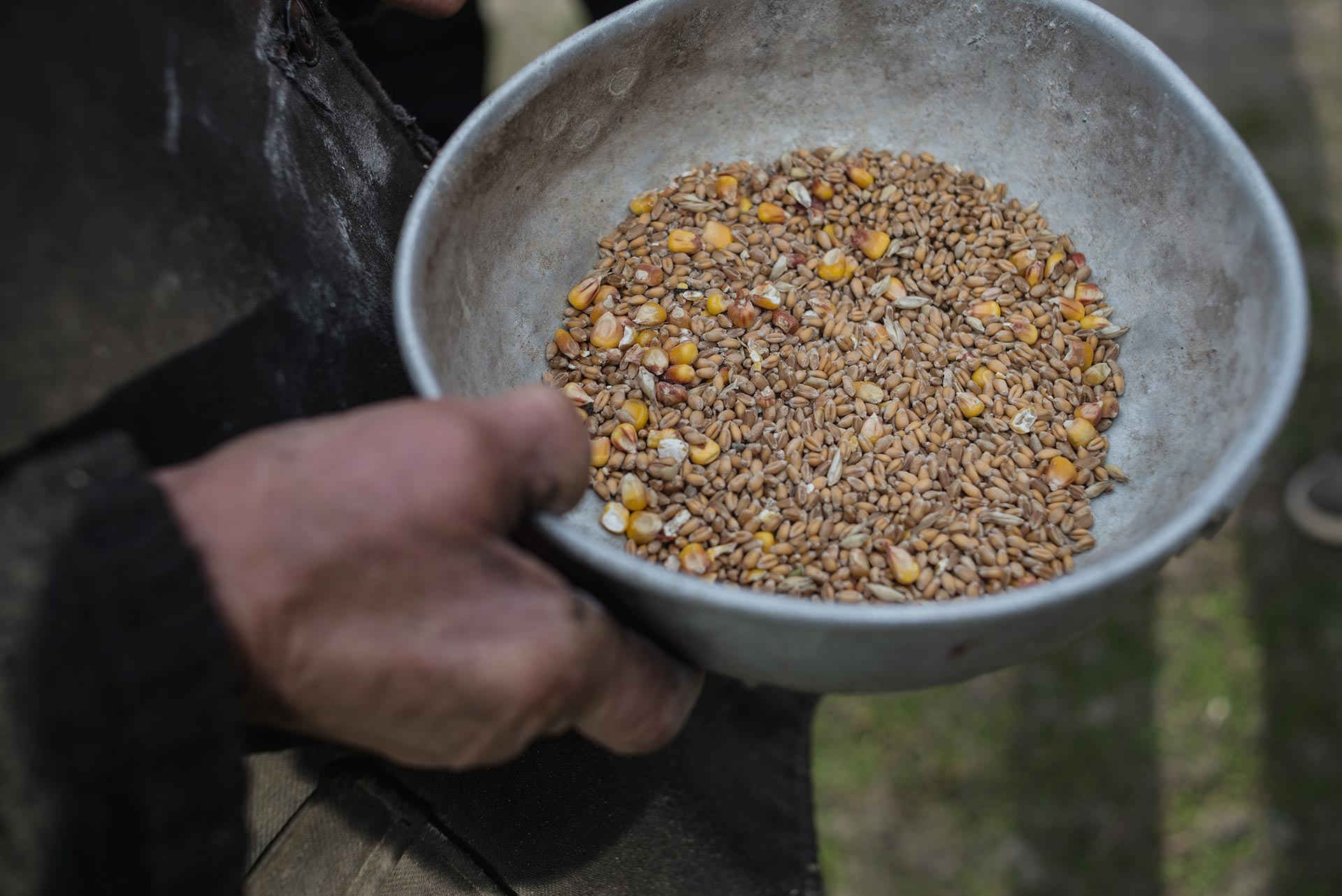
Domynika Chekun learned her first song when she was six years old. Back then, in the middle of the 20th century, every stage of the wedding was accompanied by the singing of special ceremonial songs. The wedding lasted for three days:
— My granny was invited to a wedding. I remember just like now: the wedding was for three tables. We were sitting on a stove (a big masonry stove that had an area where people could sleep during the cold winter period), the children were playing, and I was listening to the singing. When it was time to leave, a woman, my future husband’s aunt, started singing. I was a little girl, I hadn’t heard that song before, but just at that wedding, I heard it. I liked it so much that I kept singing it, and that way I learnt it. I heard her singing this song again somewhere. She was often invited to weddings — she was a singer. I learnt that song myself and taught my grandchildren to sing it.
Ms. Domynika told us that she was looking for a chance to learn from good singers in her childhood. There was a man with a very beautiful voice in the village Stari Koni. She was trying to get the timing right and tend cows together with him so that she could listen to his singing, but she didn’t want him to realize it. When she grew up, she was invited to sing all the time:
— I would take the cows to the pasture and sing all the time. I was tending cows alone. When I was young I was singing all the time. Sometimes the head of the collective farm and the community leader (a representative of the communist party in a community responsible for ideological education) would come and say, “Dania, you know what, we want to sing too.” They were also singers. So they would say: “You were singing and we heard your voice. Let’s get together and sing in the evening.” That’s the kind of life we had.
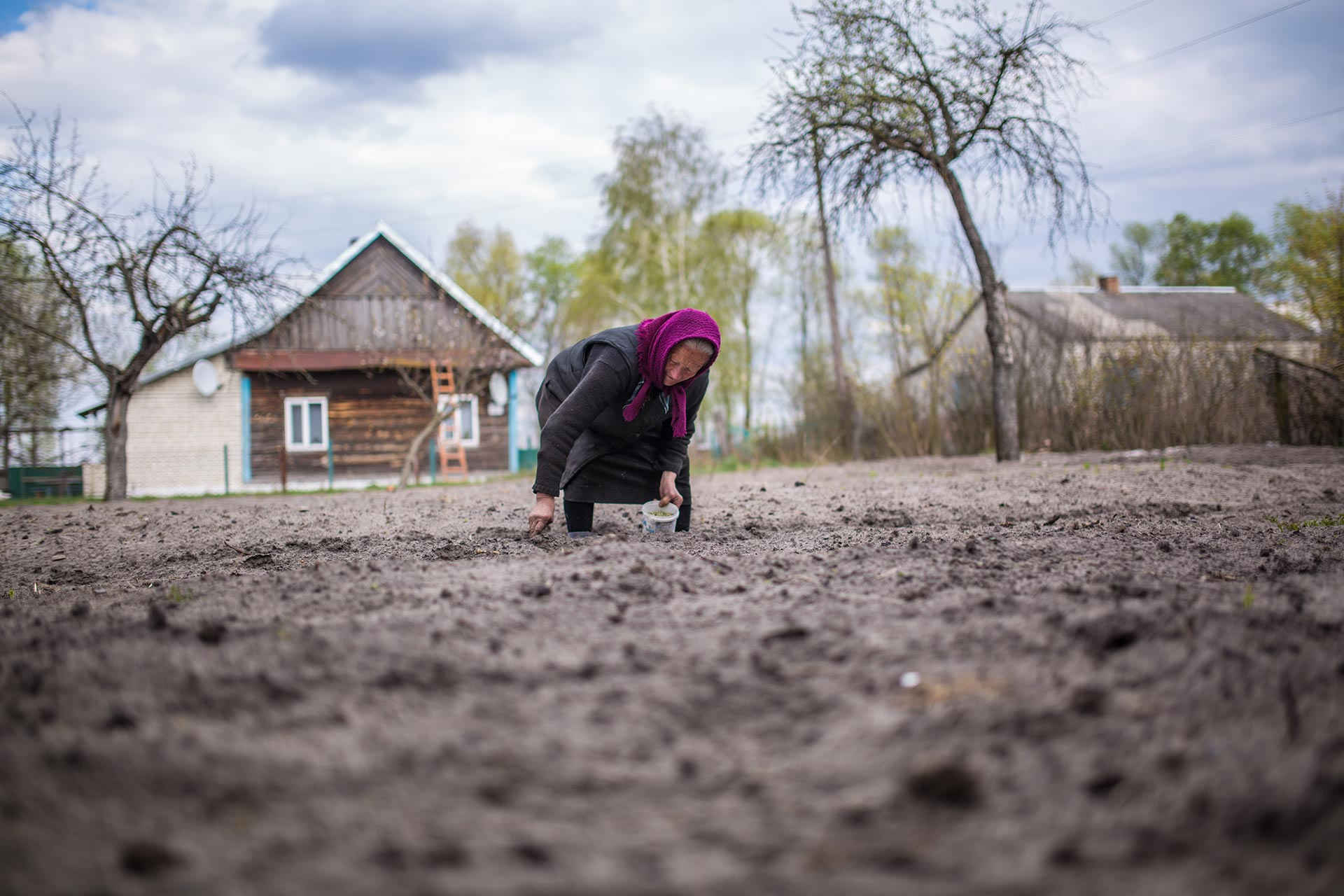
Such meetings were a frequent thing:
— There were nine of us, and we were milkers. So we would milk the cows in the evening, and on the way back home we would sing. So people were waiting: the milkers would be going home and singing. We were singing every evening.
In Polissia they still remember songs that are not wide-spread in other regions. These are so-called “bush” songs that were sung during the rite called “walking of the bush”. It was observed on the Holy Trinity when a young girl was decorated with herbs to the extent she couldn’t be recognized, and she was taken around the village, goingto each household yard and singing songs.
In other parts of Polissia there were other unique “mermaid” songs. Some elderly people still believe that drowned people and those who died during the Trinity week, despite their gender, become water spirits, young girls with loose hair wearing long white garments. Every year these deceased people come to the village to “visit” their relatives, and at the end of the week, they are seen off with special songs and rites out of the village to the cemetery. Other ceremonial songs are also preserved: wedding songs, spring songs, Kupala songs (Kupala Night is a summer celebration at night from the sixth to the seventh of July), summer harvest and forest songs, carols. They were sung exclusively by women — girls sang spring songs, young women sang wedding, Kupala, bush, and mermaid songs.
Married women sang after the summer cycle. The melodies of the ceremonial songs are simple but every skilled singer would embellish them by improvising grace notes, making the song sound rich and alluring. It gets difficult to trace ceremonial songs in villages with no talented and active people who knew and sang as much as in Stari Koni.
— Summer songs are sorrowful, the “summer” is always sung like that because it’s all about life. We have this kind of tune. In other village, it might be different. And we know by the tune that this one is “summer” and that one is “spring”. It’s this way here. But not everyone in Polissia sings like this. The village Komory is not far from here, but they sing slightly differently. We sing differently and they sing differently. Every village has a different melody.
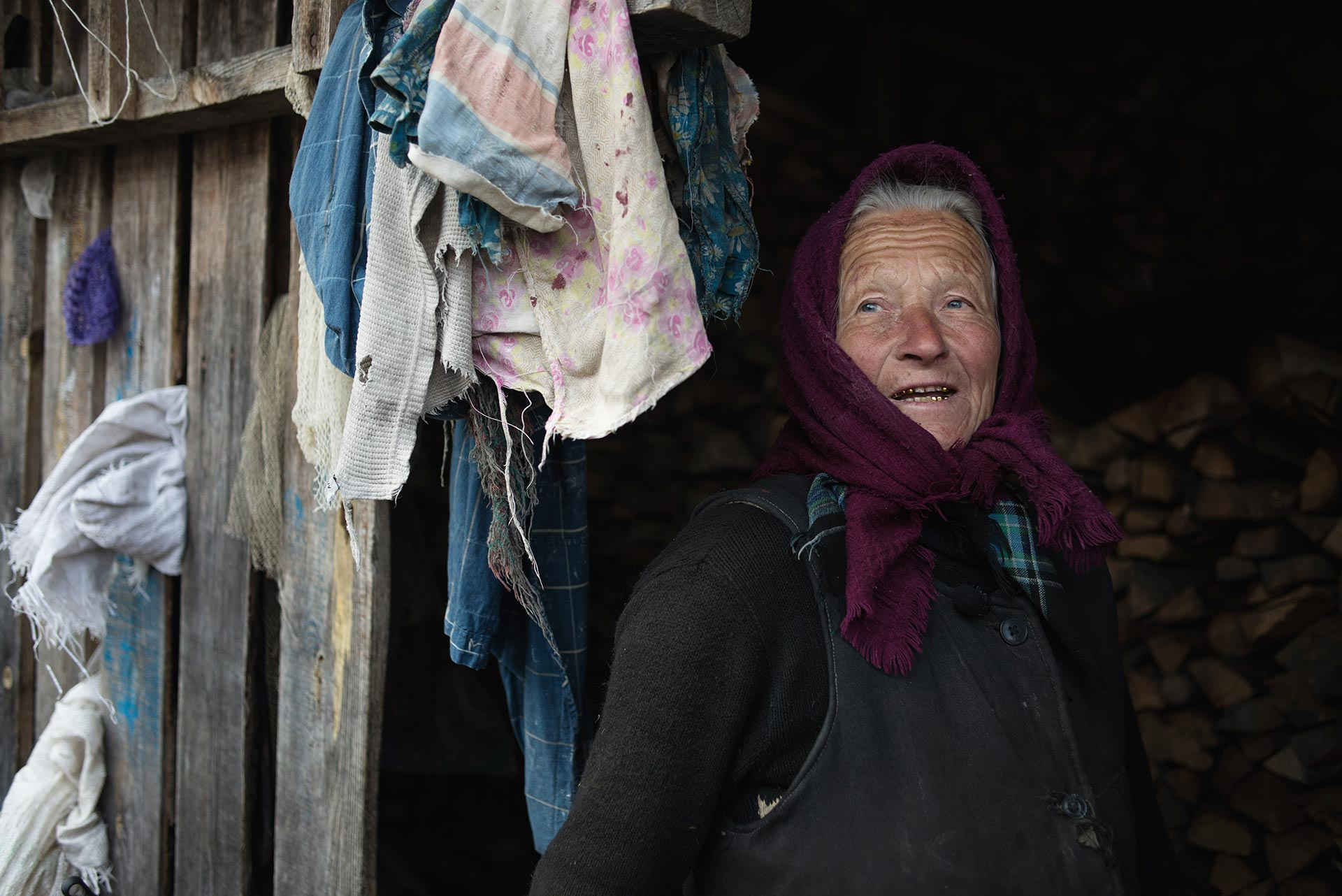
Granny Dania recalls that summer songs were sung very loudly, to the full capacity of the voice, even during physically demanding work, for example, while reaping rye. You had to sing so that everyone could hear your singing.
Nowadays, the former village Stari Koni is part of the district town Zarichne. But for Domynika Chekun it is of utter importance just as before that people know what village she is from.
— In 1978 we started traveling to other villages and districts. We were giving performances and our head (the head of the collective farm) told us: Don’t write that you are from Zarichne. The women from Stari Koni are singing. That’s it. – He wanted everyone to know that’s how we sing in Stari Koni. And Zarichne, well, they don’t sing like this in Zarichne!
Earlier Granny Dania was singing with her sisters and friends:
— Sometimes there were 9 of us, sometimes 5 of us went singing. Many of them passed away already, only two women are still around, I am the third.
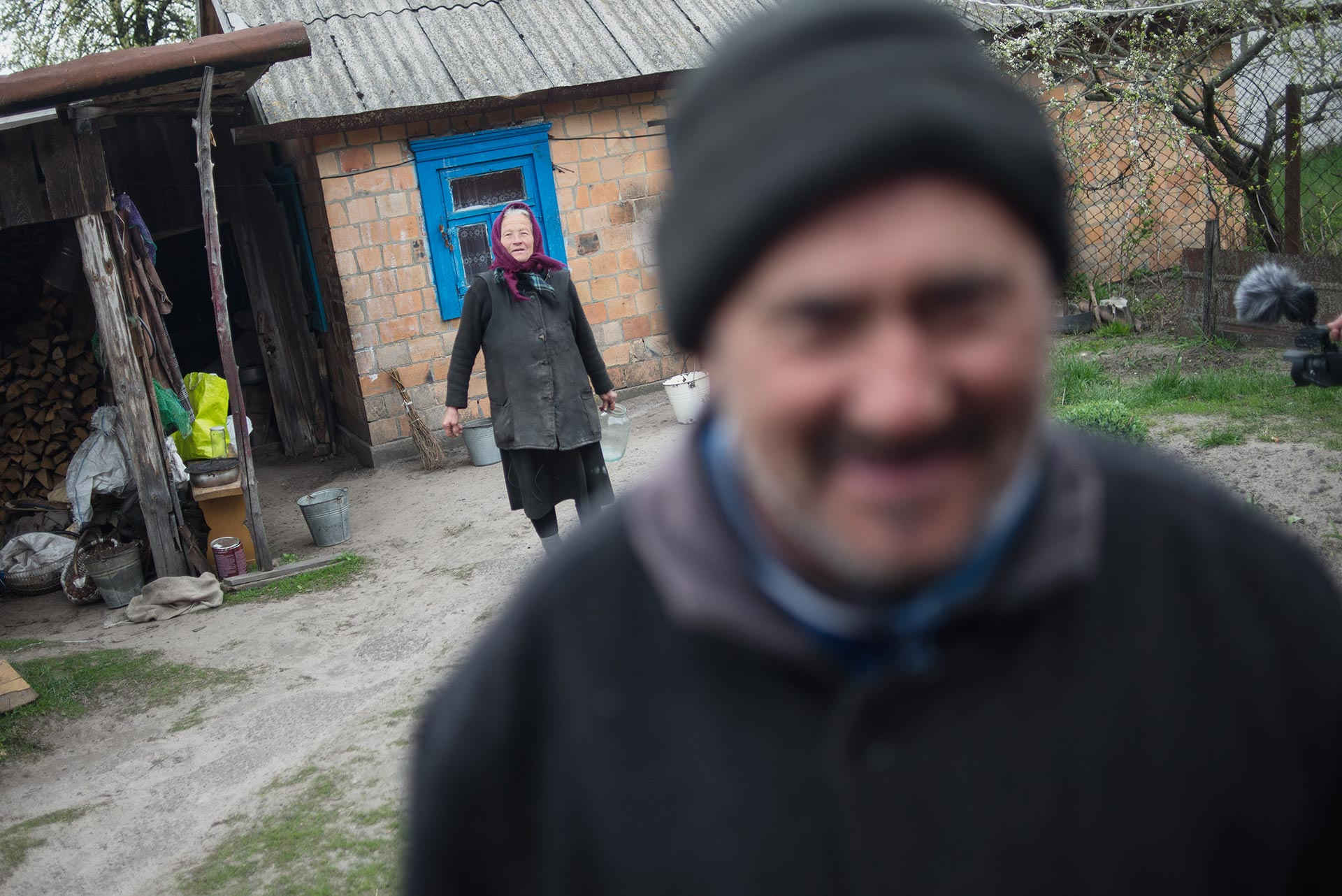
Granny Dania’s house is not a small one on a village scale: there are four rooms and a kitchen remade from her late husband’s workshop, he was a carpenter.
— There were some young men courting me, but he sank into my heart. He was the best for me. I really liked him. And he was a good housekeeper. We were running things together well.
Very often the village singers tell that their husbands were pretty jealous and didn’t let them perform. Granny Dania was lucky to have performances almost every week when she was young, either in the village or in the district center, once in a while she was invited to perform in other cities of Ukraine and even to other soviet republics.
— When he was young he didn’t sing, but then he learnt from me. He liked when I sang and would come and say: Let’s sing in the evening, Dania. I sang the first alto, he sang the second. He never reproached me for going to performances. He would polish my boots: Come on, hurry up! Get ready quickly!
There were families with different rules. “I will go!” – “No, you won’t!” – “I will chop off your head if you go!” There are such men. Once we came to one woman and there was her husband: “Zosia, come with us to sing”. She sang too. And his response would be: If you go singing, I won’t enter this house anymore.” There were such men. My husband had never told me anything like “You won’t go…” or… No, never happened.
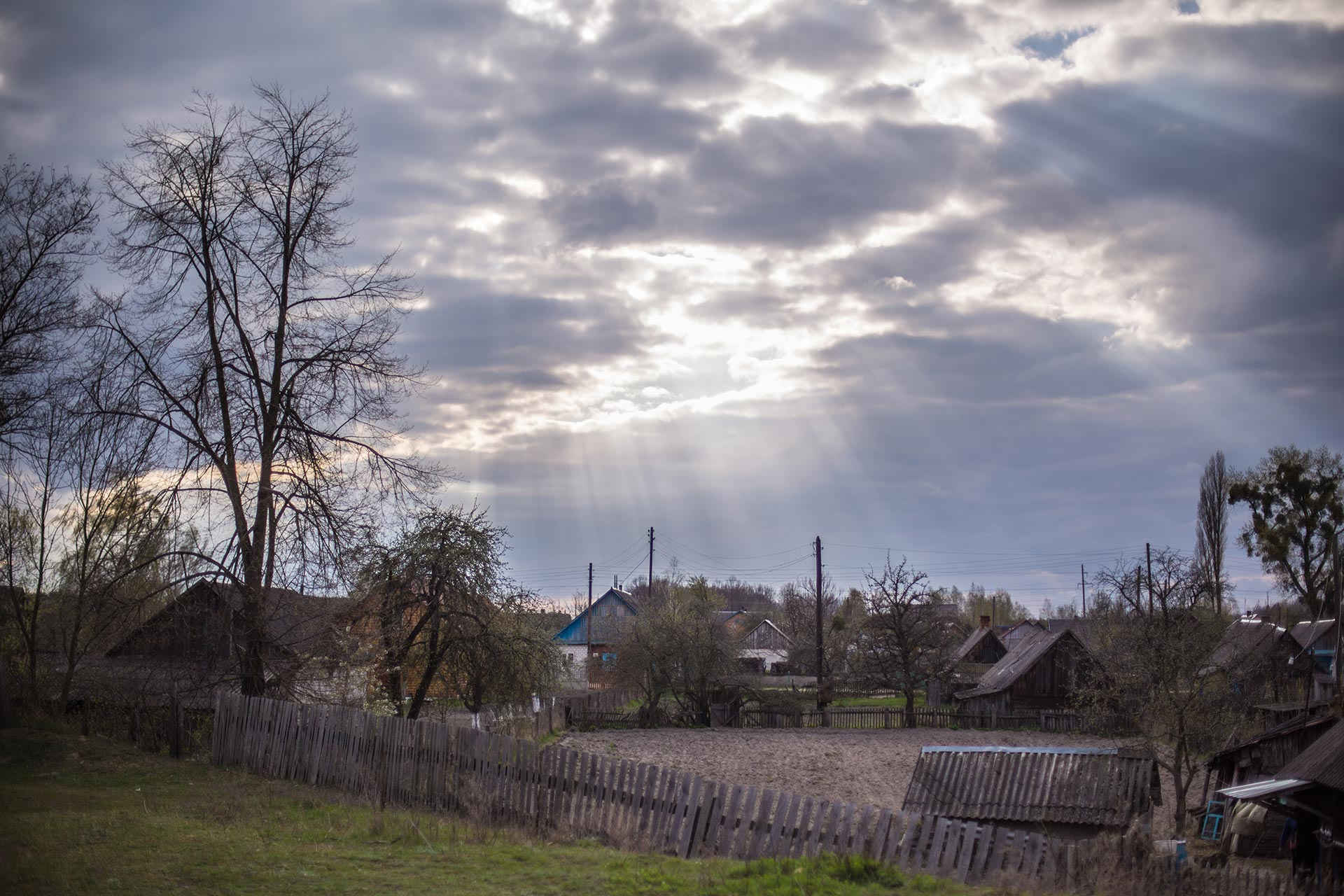
During warm seasons, Granny Dania has guests pretty often, and some of them stay for a week or even longer. People from Ukraine, Poland, Germany, and the USA come to Stari Koni to learn traditional singing — some of them just once to make records, while others come on a regular basis for years:
— So I sing and they listen. Those who want to learn will learn. If they start liking that song, they will. Most visitors are from Kyiv. There were two girls from Canada. There was a woman and a man from the USA. And the year before there were five people: two from Kyiv and three from the USA.
Jagna Knittel, Polish movie director, researcher, and singer, has been visiting Granny Dania since 2000, when she learnt about her from Iryna Klymenko, an ethnomusician from Kyiv and the first to record the singers from Stari Koni. Jagna heard Polissia singing for the first time in a performance by Kyiv band “Drevo”.
— When I came to Stari Koni, Svarytsevychi and other Polissia villages for the first time I was mesmerized and not just by songs but by people first and foremost. I mean by elderly people since I was looking for contact particularly with them. I loved to watch them: how colorfully they dress, how they speak, how they take care of their fields. I feel that communicating with them I touch something important, something genuine and what’s most important, something ancient, something that lasts for centuries.
band “Drevo”
is the first band of professional musicians conducted by Yevhen Yefremov performing traditional music without any adaptation. It was created at the beginning of the 1980s by young musicians from Kyiv conservatory.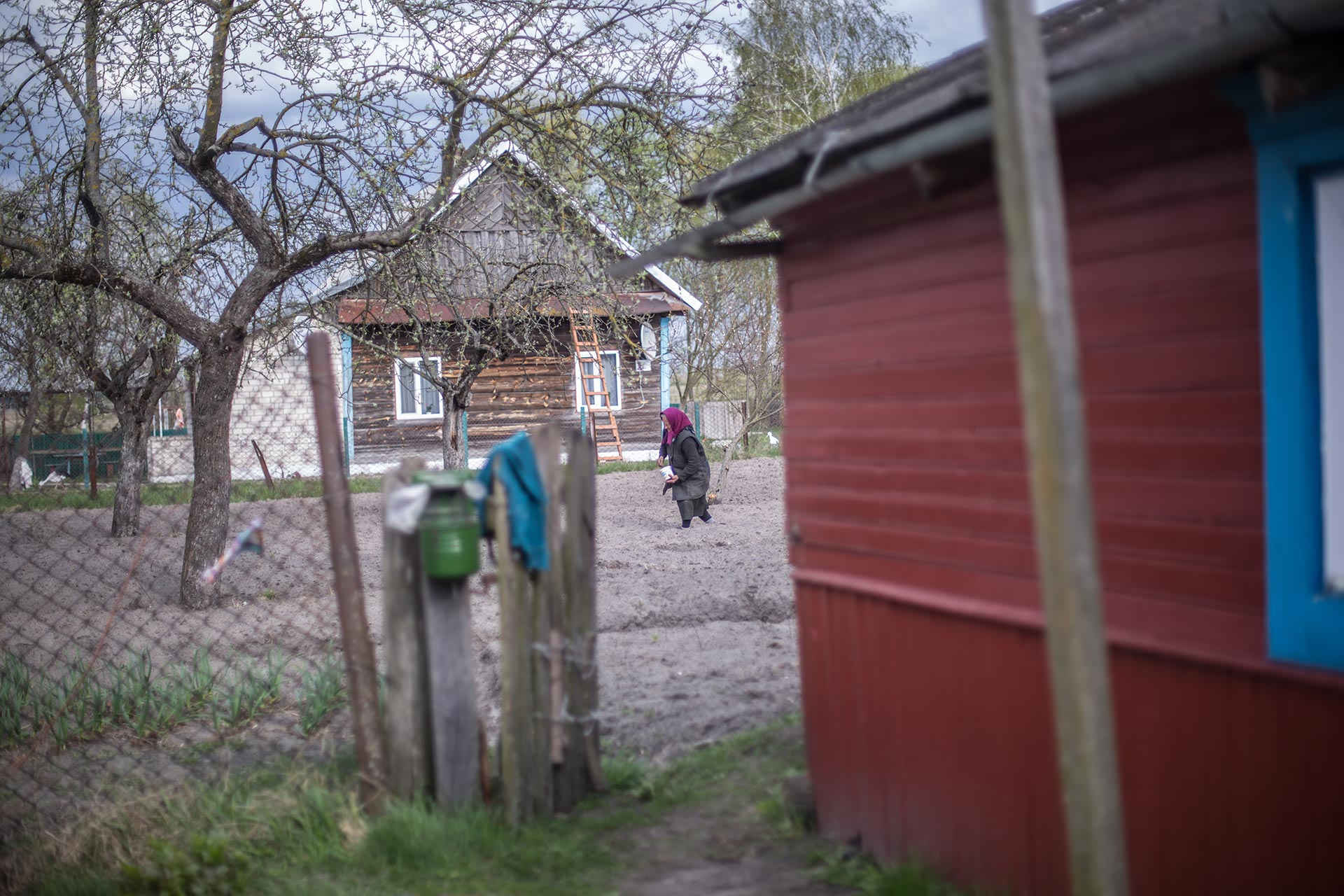
Meeting Domynika Chekun was a very unexpected discovery for Polish researcher:
— I have met many authentic female singers both in Poland and in Polissia, but in most cases, I hear only remains of old beauty. It is very different from Domynika Chekun. Her singing is really beautiful. Despite her age, she has a very strong voice, but above all she has extraordinary musical sensitivity, she is 100% an outstanding singer. She understands local style and knows what means quality singing, she has a strong sense of self-worth. She never copies some conventional pattern, her singing is always an act of creation. That’s is why you can listen to her endlessly. I have been listening to her since 18 years old, and I still listen to her with the same excitement and can’t have enough of it. I learn singing from her but at the same time, I understand that she is the unachievable master. You have to be born as Domynika in order to sing like her.
It is easier to find in the villages songs and romances (lyrical sentimental songs) that became popular at the beginning of the 20th century. The music in villages, just like anything else created by the rural population, is practical and functional. Songs and dancing melodies appeared because of certain need: to entertain, to spend time together, to accompany a rite and things like that. The old patriarchal structure was passing into history and daily life was changing too, the old rites were disappearing together with the songs. For instance, it happened to old harvest, forest songs (sang during picking berries), and spring songs. During soviet union times when the religion was under the ban, carols and psalms started disappearing too.
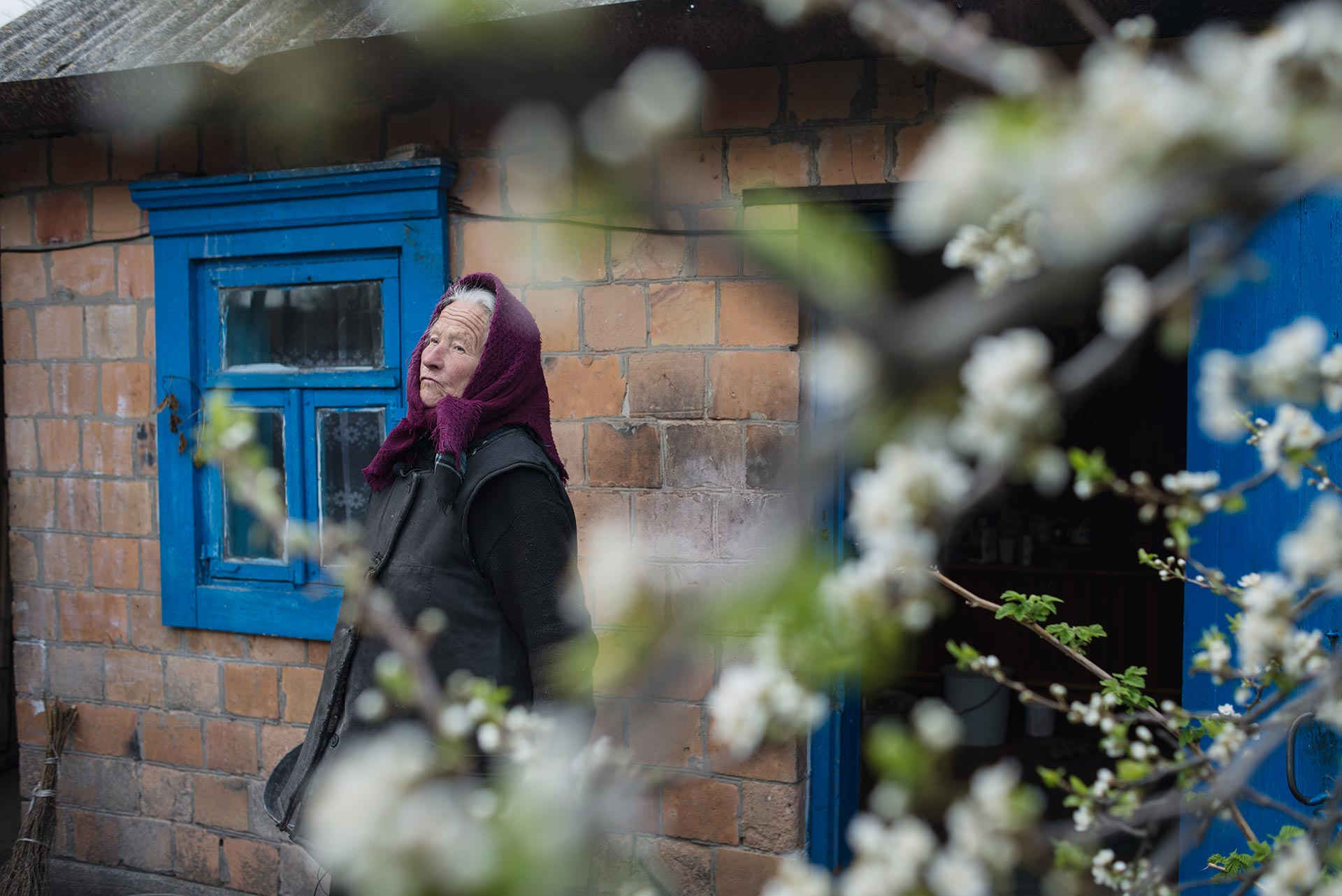
Instead of “old” songs came new songs from the cities. They were in rotation on the radio, they were learned by local choruses and children’s ensembles in the community centers. These songs were more lively and simple melody-wise that is why they were getting popularity way faster pushing out local “old” songs. However, it did not happen in Stari Koni:
— We have only Polissia songs, no outlandish ones anywhere. Last autumn we had a girl from Germany. She didn’t speak our language at all. Some guy from Kyiv brought her. So I sang for her. She said she liked it a lot. She was talking English to him and he was translating: “I liked the Polissia singing and I will come here again. You will see I will come again”.
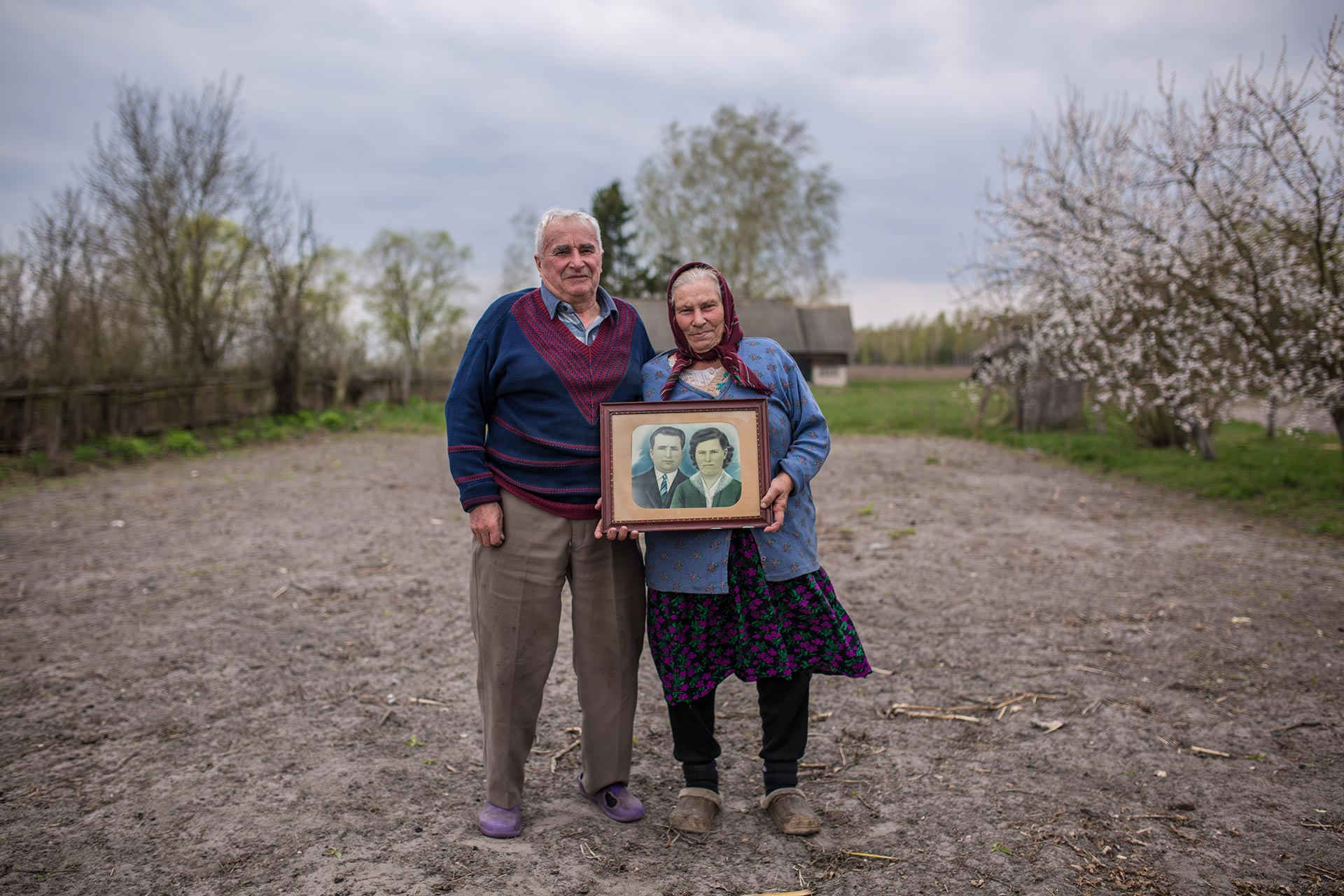
Komory. Mykola and Tetiana
In the neighbouring village Komory, there are the same wooden houses painted with blue oil paint. Mykola and Tetiana Vaskevychi, an elderly couple, live in one of such houses. Tetiana is a smiling and active woman, a former head of the village community centre. She told us about singing in the village chorus when she was young:
— We had a chorus, “Lanka”. So we sang. I have even forgotten when it was. I have to check my records. And now everyone is old, most of them are 80 years old and hardly walk.
Today, there are 38 inhabitants in Komory. Tatiana’s friends have health issues and don’t get together to sing:
— There was one lady who we called the “life and soul of the party” but she died. Others don’t feel strong enough to walk. There’s hardly anyone left.
However, this was not always the case. Some time ago the local chorus performed quite often, in Svalovychi and all over Ukraine. The choir went to a forest for a picnic after the concerts.
— They are all blessed with singing talent in Komory since forever. I would come to the street as a kid and hear the village buzzing. There were a lot of people back then, and every group of girls would sing. Or they would start dancing in the street. Where do you think we learned to dance? We learned to dance in the street to live singing — nobody played instruments for us.
Mykola recalls how young people would get together to sing and to entertain themselves:
— There were 10 or 12 ensembles with girls of different ages. They sang together since childhood. The whole village was buzzing: one ensemble would sing here, the other one would be singing there.
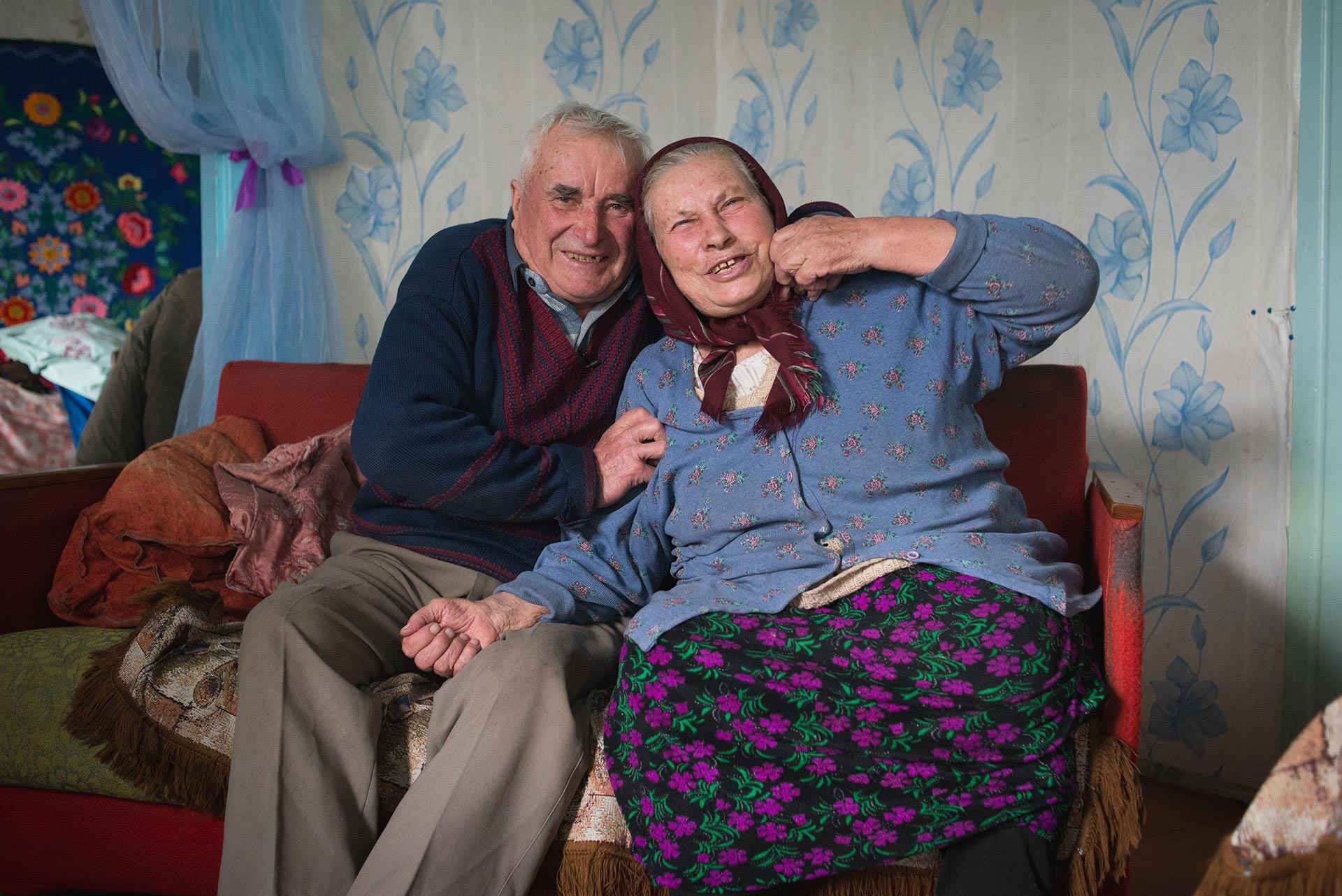
The spouses recall that after the Second World War, young people would get together to sing and dance at somebody’s house because there was no community centre at that point:
— They would rent a house for music and dances. Young people would do that. They would pay the owner to rent a house for a night to play music and dance. While there was no community centre the houses were rented out. Our house was used that way a couple of times too.
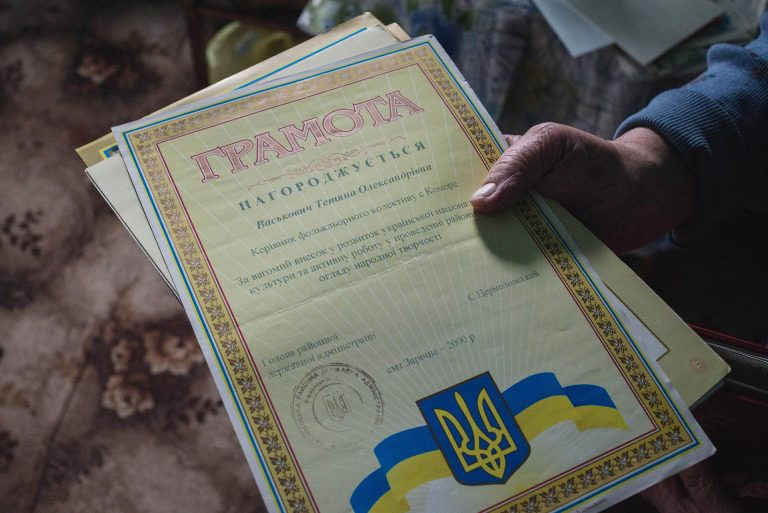
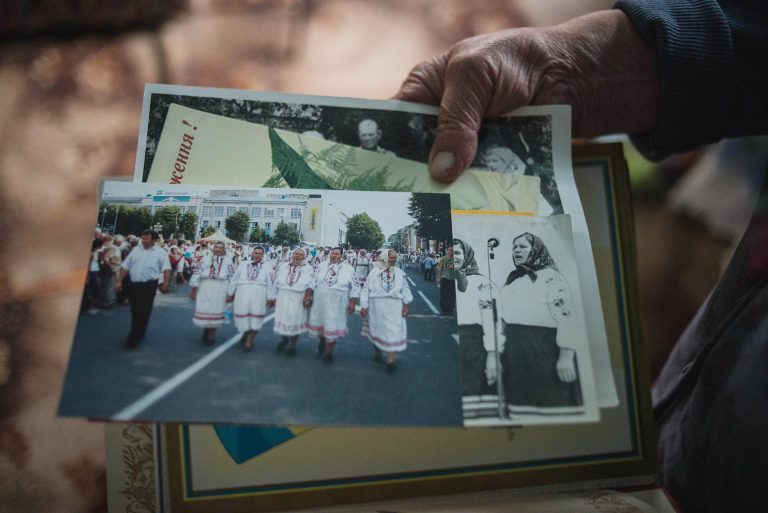
slideshow
Tetiana takes out certificates of appreciation, newspaper clippings, and photos from the chorus performances:
— I will have a look at the photos, I will read at least. I will put them all in front of me and will shed a few tears, those times are gone. The life has passed and my years will not come back. So I would take a look at all these photos, cry for a while, and take everything away.
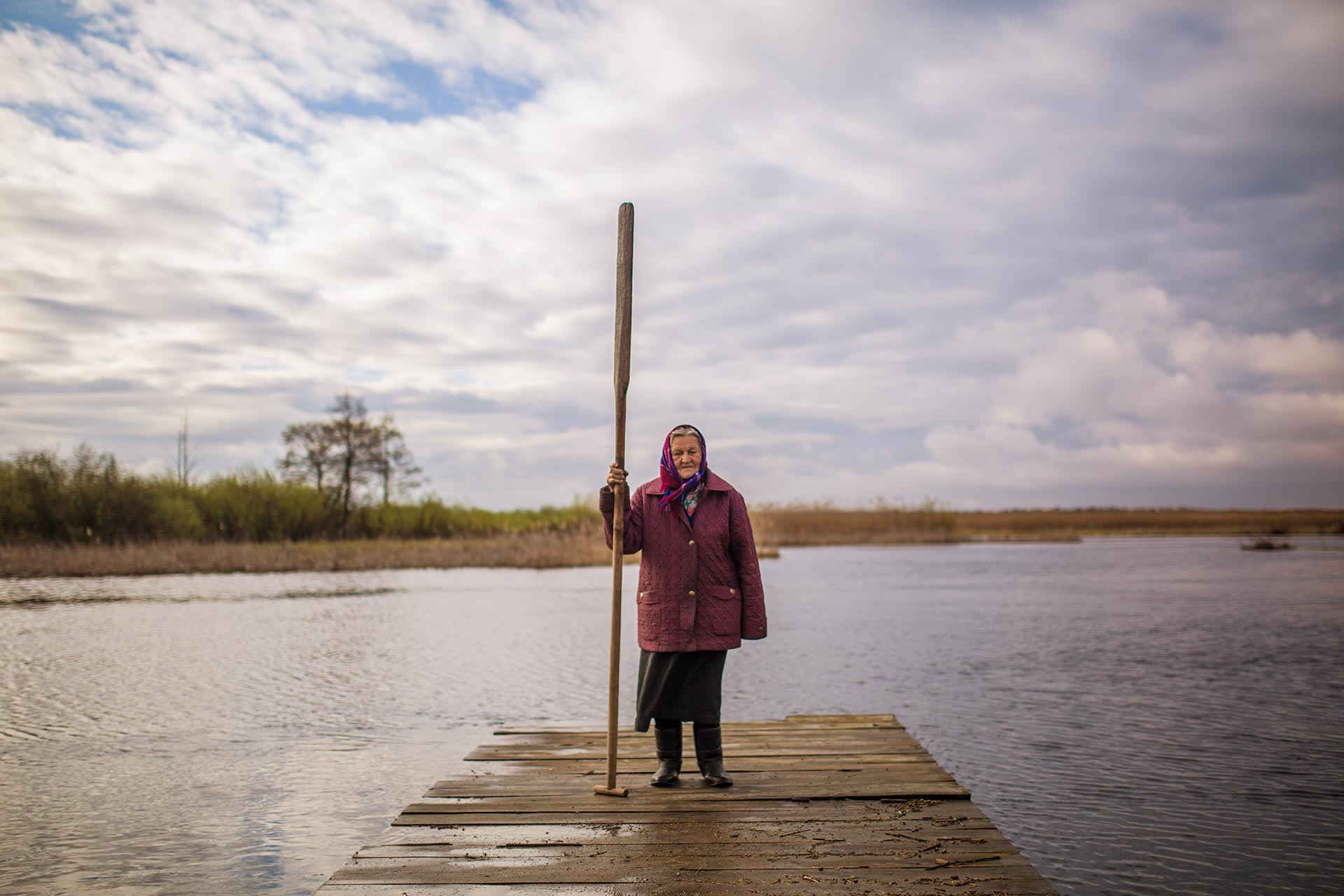
Svalovychi. Kateryna
There is no community centre or a shop in Svalovychi, and a truck brings bread once a week. Kateryna Trush lives here. She is alone in her housen — her husband died a long time ago and the children moved out:
— I am in sorrow for my husband. I was 50 years old when he died. I am more than 20 years, closer to 30 years, all alone. The children moved out: a son and two daughters.
Kateryna recalls the way people spent free time in the past. And even nowadays they still get together:
— Good heavens, they sang so beautifully here. They sang Ukrainian songs. They still sing them today. There is one woman so when we meet we sing.
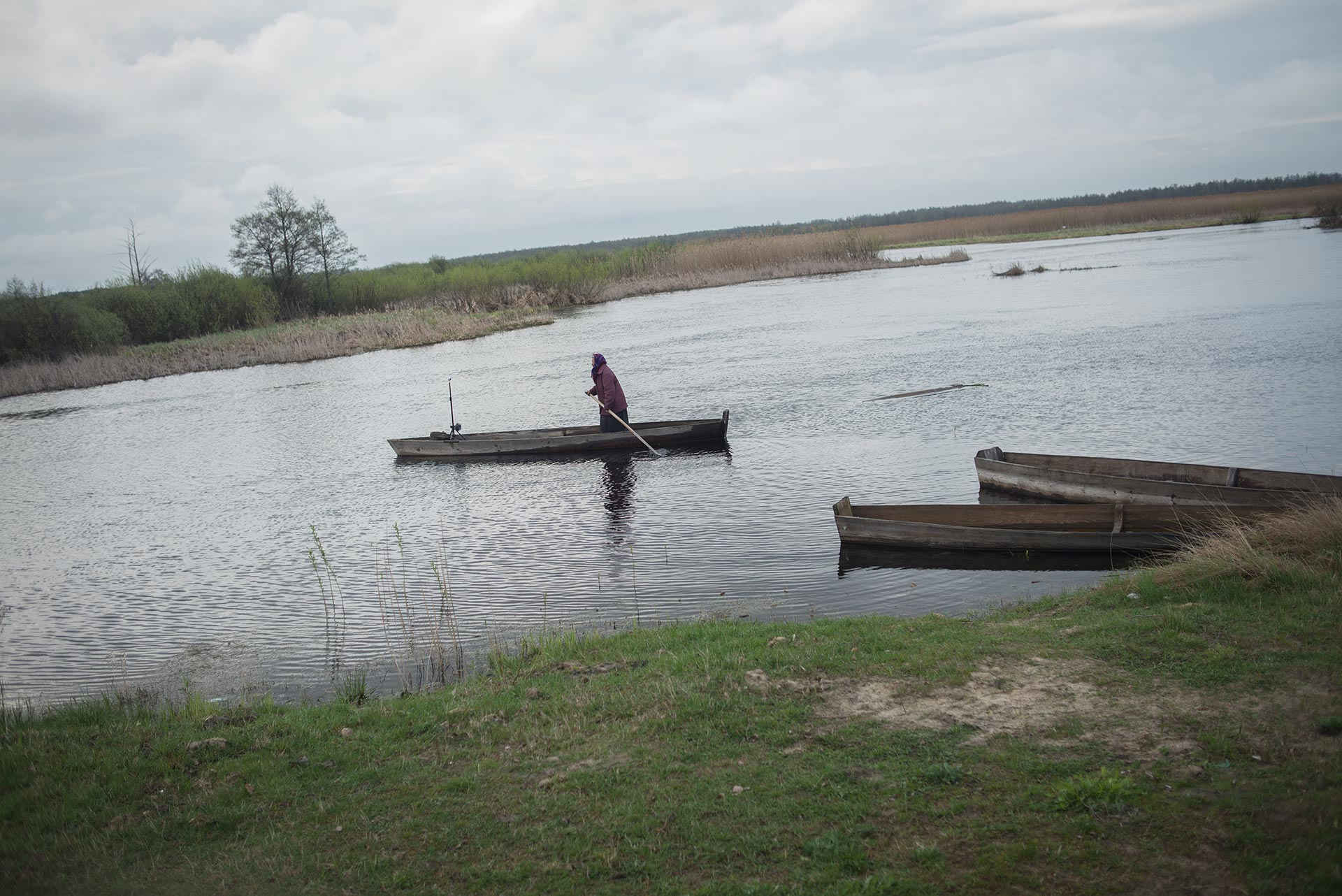
She recalls the songs — most of them are lyrical songs of Soviet times. Some of them are in Russian, though adjusted to the sounds of the local dialect:
— You can walk through Svalovychi and not find anyone who would sing to you the way I do it. They send everyone to me because nobody can sing old songs the way I can.
If you ask Kateryna how many songs she knows she answers with a smile, “A ton!”
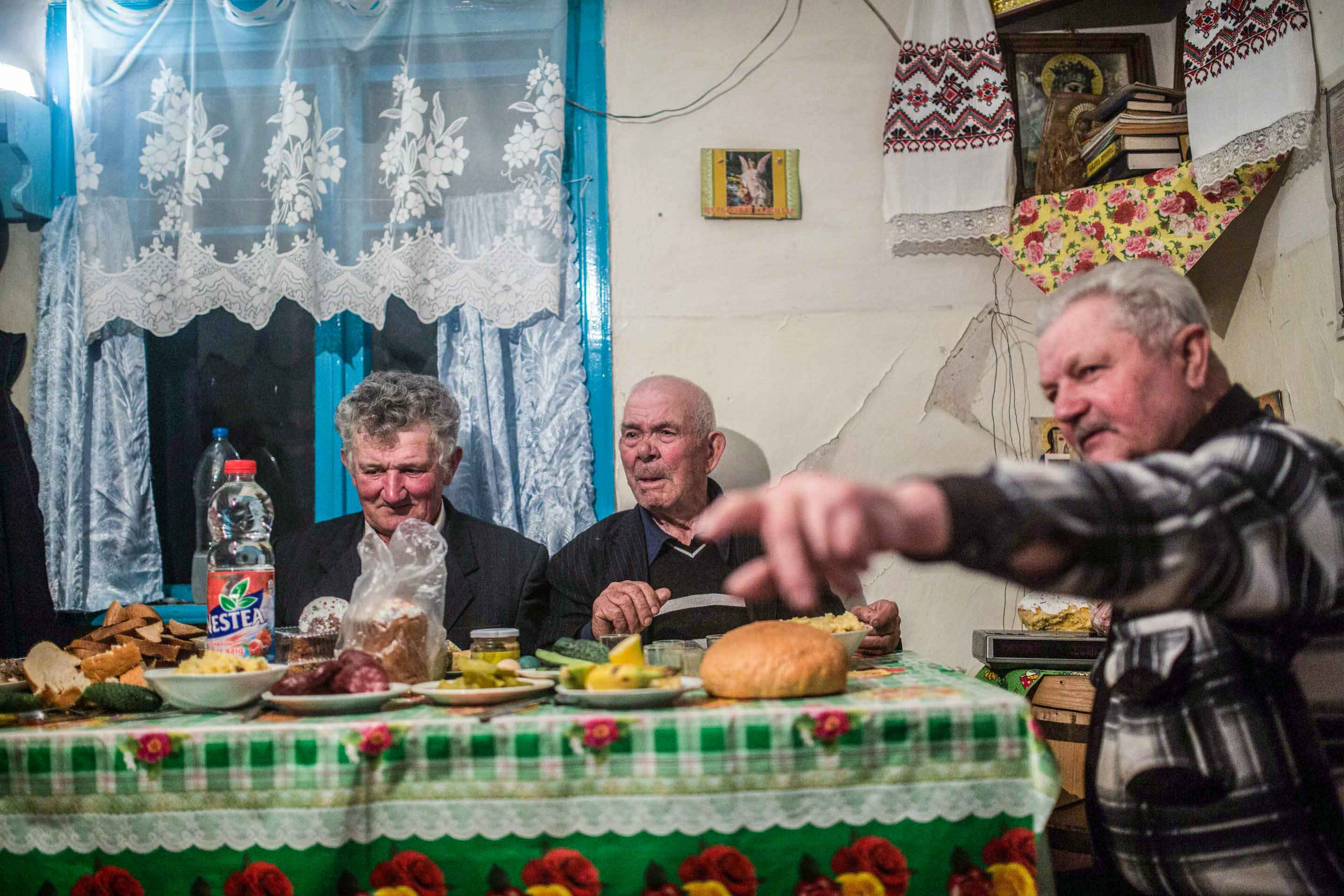
Chornyzh. Men’s chorus
Men never sing ceremonial songs (except carols) because to sing the ancient songs that accompany rituals is a privilege of women. At the same time, in many regions of Ukraine, the tradition of male singing developed in old times. When Cossacks were on a march, at wars, or on journeys with chumak people (Ukrainian oxcart drivers transporting grain to Crimea and bringing back salt, fish) to Crimea, in times without the Internet, television, and radio, when trips to other parts of the country were measured not in hours but in weeks and months, men had a favourite and reliable entertainment: to sing songs.
Just like all other lyrical songs, men songs were sung in two or three voices: middle voice, supporting voice, and bass. The melodies and techniques differed depending on the region of origin of the singer.
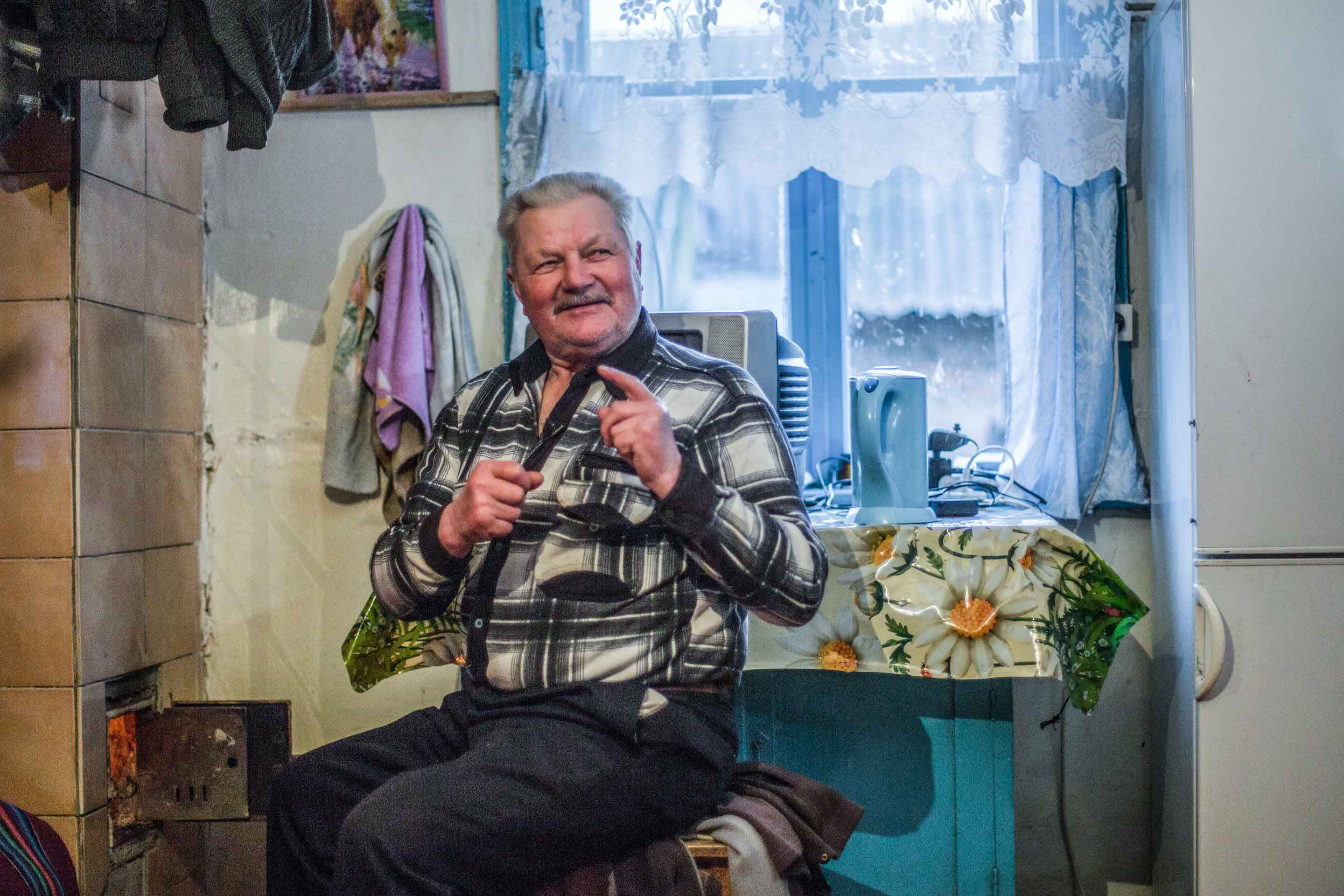
Their songs were telling about the harsh life of village men: loss of friends in battles, a death far away from home. But men also sang sarcastic songs as well as ones about love — just like in everyday life.
Hard work, wars, underdeveloped medicine, and a habit to ignore health issues resulted in a decrease in the number of men who got together to sing those ancient songs, and with time women started singing “men” songs in some villages.
However, in the Polissia village Chornyzh local men get together to spend time with company, singing songs, just like many years ago. They are barrel makers who still produce wooden barrels manually.
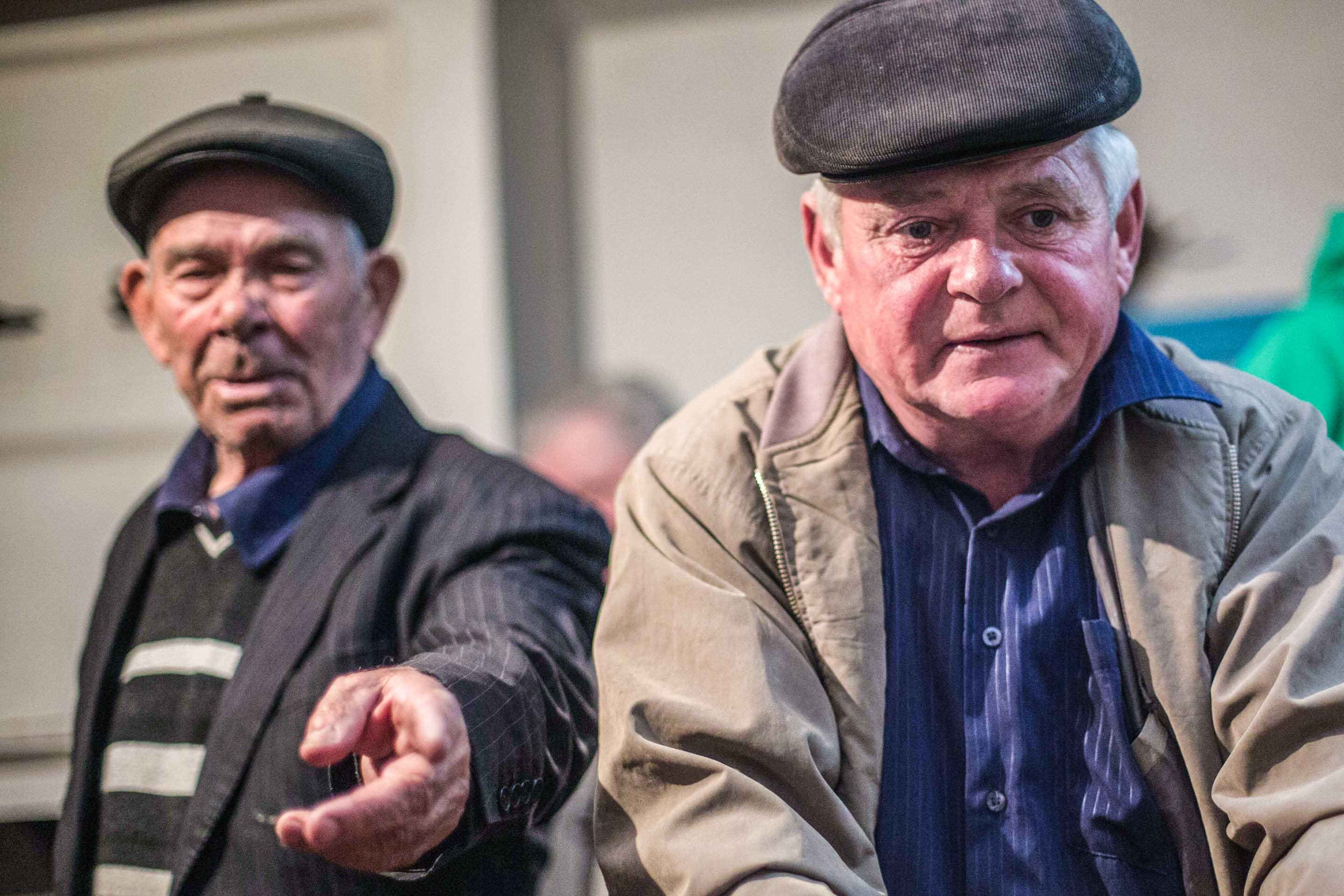
The researcher Iryna Klymenko is telling us about her first experience meeting those singers together with her colleague Oleksiy Nahorniuk:
— We came across them in autumn 2016. This is a transitional area where Polissia borders with Volyn, but it’s still considered to be Polissia. We asked the head of the neighbouring village council about female singers and he said: You know, women don’t sing in our village. But you can go to the next village, it’s not that far and ask there about Baliosh. So we went there and spent a couple of hours wandering around in search of Baliosh (Serhiy Kalkov), we were circling for almost two hours, he couldn’t be found anywhere, he was away doing some errands.
Meanwhile in the house of Baliosh’s neighbour, a team of young women got together following the word of mouth about the singing:
— The thing is that if singers are younger than eighty years they are of no interest for a specialist, they mostly perform kitsch style songs. So they began striking into the boring kitsch-like psalm songs and in the middle of the song the door opened and entered Baliosh. Firstly, he didn’t look like village people. Secondly, he wasn’t dressed like them. As a rule, men wear some kind of flat caps, with turnip noses on their large characteristic for Polissia and this man had chiselled features, handsome grey, in a military-style hat, so he opened the door and asked, squinting, “what is going on here?”, since his neighbours had already informed him that some people had been looking for him. He entered the room, got comfortable on the sofa trying not to interfere the singing and joined them in powerfully and energetically. When he began singing I knew that we had chased him all over the village, not for nothing.
It appeared that in this Manevychi-Kivertsi corner (between the rivers Styr and Stokhid) the tradition of male singing died away no so long ago in comparison with other areas. There are still people that keep singing. They perform songs of earlier style but they carry Ukrainian tradition, it is not kitsch.
It is always hard for Tymofiy to sustain high notes, high pitches — his health is poor and his age is taking its toll. But the main thing about singing is to spend time with others, to have this common experience of unity through music. The men still try to get together, especially in summer after having taken care of their homesteads. Just like other village singers, they learned singing in childhood. Singing was the kind of entertainment that was always with you, whether you were walking somewhere or pasturing the cows all day long — they learned in passing, from older boys and from one another. Earlier they sang in a village chorus.
You see, there used to be such a thing: the regional authorities would oblige the head of the collective farm to prepare a summary concert. We were reporting. And not just our village, all the villages had to prepare it.
Tymofiy continues:
— They would dictate us which songs to sing.
village choruses
used to be a popular kind of “amateur art activity” in the Soviet times. They were mostly performed choral arrangements of traditional songs and ideological songs about the Soviet system.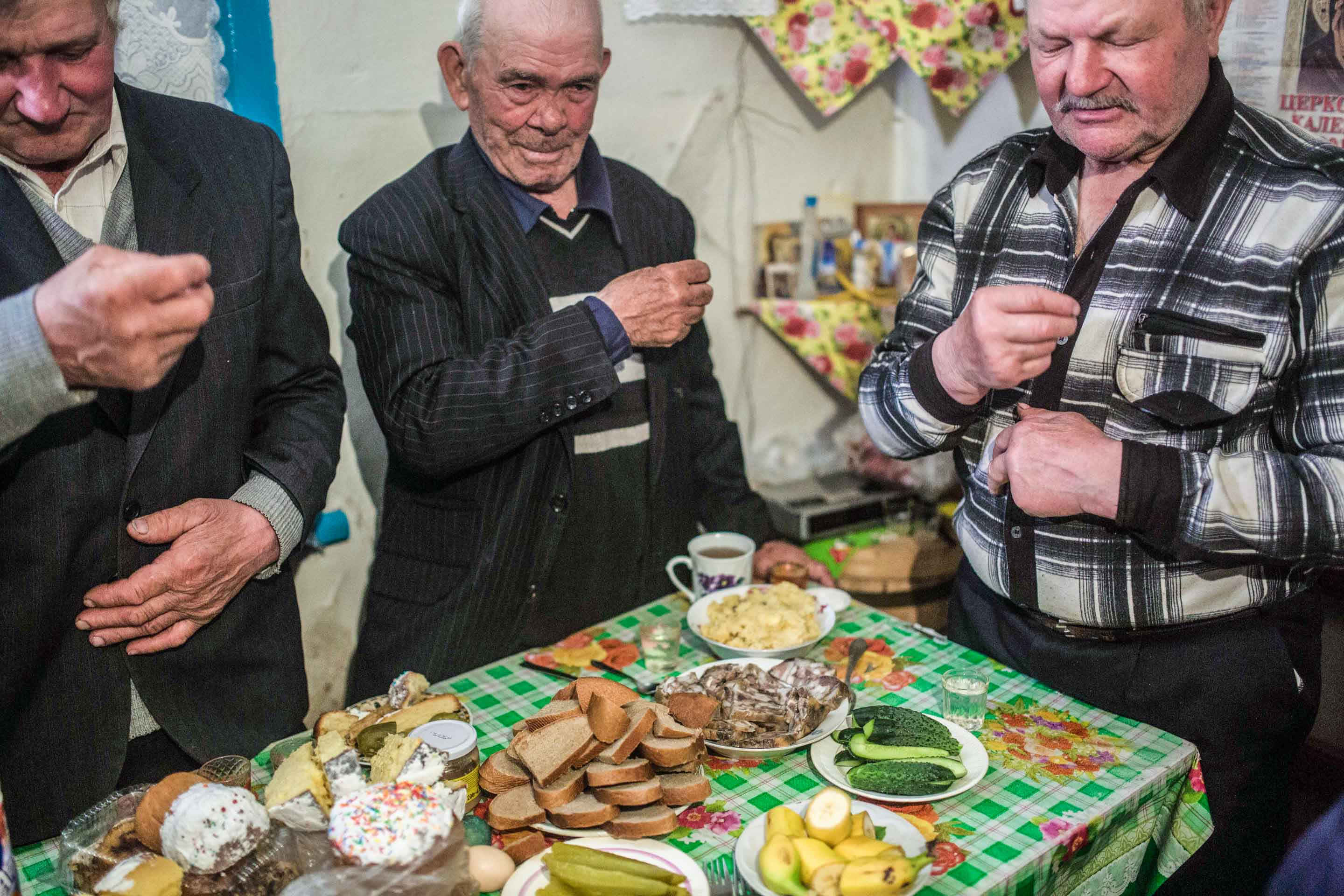
For the last 26 years, they have been singing in church on Sundays.
Men sing much older lyrical songs more recent songs of the Ukrainian Insurgent Army (UIA), since the UIA was very active on the territory of Polissia, along lyrical romances that became popular at the beginning of the 20th century. They call those older songs “natural” songs and say that you can’t find them in any book — those songs were sung by their parents.
Sometimes young people also learn to sing traditional songs, but their technique compares poorly to the authentic style, and experienced village singers notice it:
— First and foremost, they have never pastured cows, so they didn’t learn. No school teaches that.
How we shot the video
Check out our new video blog about how we travelled through Polissia and the shooting conditions; the Polissia ferry trip with our Land Rover; mixing up a house in Komory; and something that the village Zarichne is famous for apart from its narrow gauge railway.

